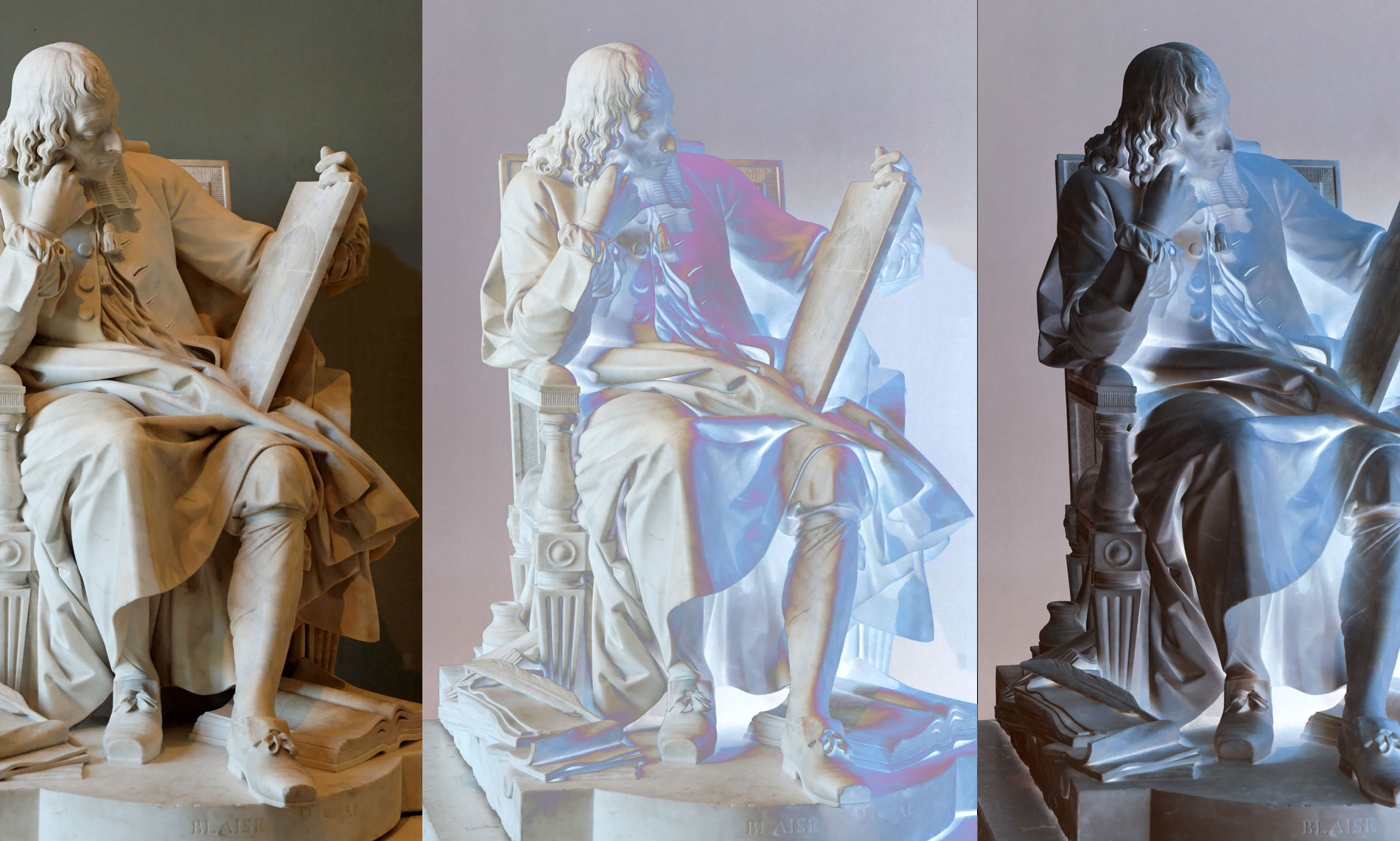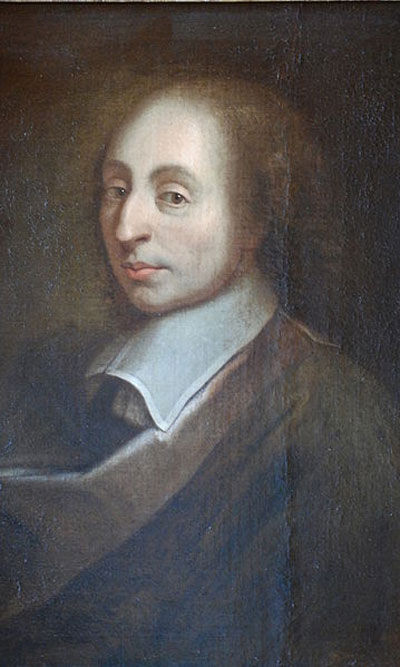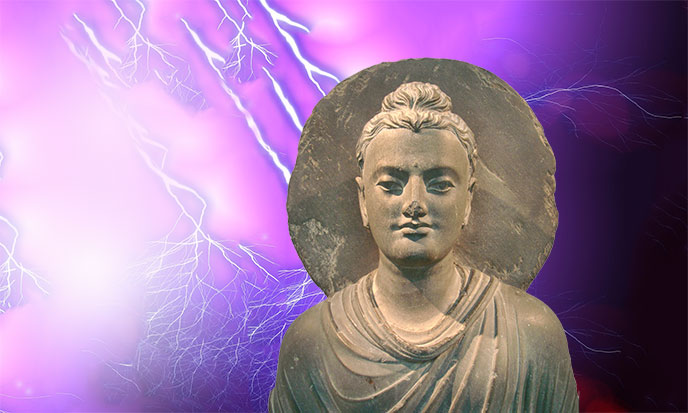
Like Jean-Jacques Rousseau, Blaise Pascal does not appear in the pantheon of philosophy. Pascal is not a true philosopher, but rather a mathematician who plays the thinker. His bet on the existence of God seems childish today …
Pascal’s wager is a philosophical argument developed by French philosopher, mathematician and physicist Blaise Pascal in the 17th century, which tries to prove that a rational person has every interest in believing in God, whether God exists or not. Indeed, if God does not exist, the believer and the unbeliever lose nothing or almost nothing, but if God exists, the believer gains paradise while the unbeliever is locked in hell for eternity.” (source)
How can one write such nonsense? One would have “any interest in believing” something that could be wrong? All this for an illusory post-mortem comfort? Do not displease you, Messire Blaise, the belief does not command, does not reason, does not put itself in equation. The seeker of truth can consider himself happy already if he manages to balance the belief by non-belief. This is the way of believing without believing, which I often emphasize because this key that opens many doors, while offering an alternative to the ego, the dictatorship of the dominant self.
But this text is not Pascal himself, it is signed Wikipedia, the encyclopedia of ready to think. Let’s see the exact words of Pascal: “Your reason is no more hurt, choosing one than the other – whether God is, or not – since it is necessary to choose, here is a point emptied, but your bliss, we weigh the gain and the loss, taking the cross that God is, consider these two cases: if you win, you win everything, if you lose, you do not lose anything, so be sure he is, without hesitation. ” (source)Blaise Pascal, Pensées, trad. Xavier Séguin
 As a matter of philosophy, Pascal tells us stories that are unworthy of any sincere seeker. A bet! As if the existence of God was played in a gambling den! We dream while standing … First, see this: “since it necessary to choose” says the author of Pensées. That’s where the trap is. Where he slips. Precisely here he leaves the domain of thought to enter the scam. No, Master Blaise, do not choose. The philosopher takes care to refuse the dilemmas. A dilemma is a forced choice between two hypotheses, here: God exists, God does not exist. There I think I hear my good teacher Jean Millet, Bergsonian philosopher, serinate me his serenade: Never at the big never will you let yourself be locked in the grip of the dilemma!
As a matter of philosophy, Pascal tells us stories that are unworthy of any sincere seeker. A bet! As if the existence of God was played in a gambling den! We dream while standing … First, see this: “since it necessary to choose” says the author of Pensées. That’s where the trap is. Where he slips. Precisely here he leaves the domain of thought to enter the scam. No, Master Blaise, do not choose. The philosopher takes care to refuse the dilemmas. A dilemma is a forced choice between two hypotheses, here: God exists, God does not exist. There I think I hear my good teacher Jean Millet, Bergsonian philosopher, serinate me his serenade: Never at the big never will you let yourself be locked in the grip of the dilemma!
The thinker worthy of the name, the honest researcher hastens to flee this chopper. Whatever the choice, we do not understand. Because the premises are not clear. The premises must be unclear for a dilemma to appear. Clarify the premises, the dilemma disappears. The pincer is loosening, you are free again. A seeker of light is conceived as free. Tell me, in this case, what are the premises? God. That’s not clear. We all have an idea of God, no doubt his ideas are different, depending on our origin, our culture and our faith. God? Who can give the definition?
God can’t be defined, God can’t be put in sentences. If God is absolute, as the Book religions –ie Judaism, Christianity and Islam– teach us, then the absolute can not be apprehended by the human thinker, resolutely relative. Comically contingent. The human ant is not absolute … except its immortal spirit and soul. So, tell me, is the human divine? Yes, I believe it. There is God in human. A divine seed that is our responsibility to germinate in our hearts. God is a concept by which we measure our pain, sang John Lennon. God is an idea, an abstraction, a guiding principle, a theorem, a convenience of language …
But this God, a pure philosophical concept, is not the one Pascal speaks with his childish gamble. Pascal’s God is a Catholic God. A little deviant however, because Pascal was Jansenist. In the eyes of the Most Holy and Most Venerable Roman Catholic Church,I’m only kidding Jansenism is a schism. Pascal was not in the line. The bishops hate Pascal. They do not marry, do not change, and above all do not bet. The bishops are sad. Papists are sad. Too bad.
Let’s forget Pascal’s deviance, it’s not my subject. I am telling you about Pascal’s idea of God: a physical being, a pure spirit, the creator of all that is, the destroyer of all that is no longer, a transcendent spirit, a loving son, an Almighty father, all forming one infinitely good supreme being, a comforter, a punisher too – “the unbeliever is locked in hell for eternity.” Sad song. Eternity is long. Especially towards the end. My darlings, I speak the truth, such a God is very unlikely to exist.
![Deux témoignages des anciens astronautes - SKI, Stef Kervor Infographie, Eden Saga -- d'après : Premier plan à droite : Joueur de balle, Guatemala / Ball player figure, Guatemala - By LACMA (http://www.lacma.org/image-library) [Public domain], via Wikimedia Commons --- arrière-plan : Petroglyphs called "astronauts" recently white coloured (probably plaster). Zurla Area, R 1, Rock Art Natural Reserve of Ceto, Cimbergo and Paspardo. Nadro, Rock Drawings in Valle Camonica. - author unknown / auteur inconnu, public domain, https://commons.wikimedia.org/wiki/File%3AAntropomorfi_chiamati_%22Astronauti%22_-_Zurla_R_1_-_Nadro.jpg](https://eden-saga.com/wp-content/uploads/anciens-astronautes-figurine-petroglyphe-ski-1000x600px.jpg)
I introduced the notion of “former gods” to highlight the enormous difference between these gods, who have actually lived on this planet, and the modern idea of God made by the religions of the Book. For the believers of these religions, God is above all the guarantor of eternal life. And that is the essential. Live after death, or disappear into the common pit of time? “The immortality of the soul is a thing that is so important to us, that touches us so deeply, that we must have lost all feeling to be indifferent to knowing what is in it. Thoughts must take such different paths, according as there will be eternal goods to be hoped for or not.” (source)Blaise Pascal, Thoughts, translation X Séguin
There we touch the heart of the problem, which is not the inexistence or the existence of God, whatever it may be, but that of the meaning of our passage on earth, as Francis Kaplan explained: “We have to to be concerned about the problem of God’s existence because we are mortal, that we can not escape the problem of the meaning of our life.” (source)
It echoes this analysis, which has the merit of formulating as a philosopher what Pascal expresses as a mathematician: “We are not born for something, we are going to die for nothing … it’s a kind of scandal of reason that makes us can not accept this truth, so we can read Pascal’s bet not just as a text of religious proselytism, but as an urgent invitation to us, as a reader, to find meaning in our existence, because that it is absurd not to postulate a meaning to our existence.” (source)Adèle Van Reeth
Scandal of reason? Hum! And if the reason was not the right way to solve this question? Faith is not the reason. Belief no more. Hope even less. Love has nothing to do with it. Reason, my friends, bloody reason! For what it serves the truth seeker, he would better forget it. “Lao-Tzu said, you have to find the way, so I’m going to cut off your head,” repeats madman Didi in The Blue Lotus. (source)Hergé, Tintin et le lotus bleu, Casterman Poor Didi has lost his mind, but he still remembers the words of Lao-Tzu. Use the intelligence of the body, not that of the head, Lao-Tzu said. The mind is a liar. Follow the law of the heart. Use love, use the strength of soul, stay resolutely in the path with a heart, live every moment as if it were the last.



